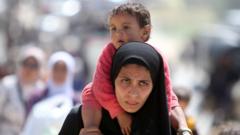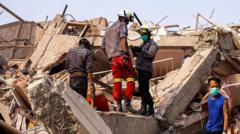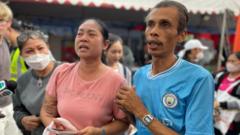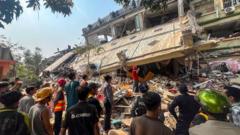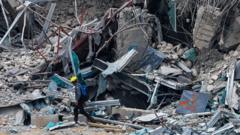As Myanmar grapples with the aftermath of a devastating earthquake, the road to recovery is fraught with challenges. The military's recent appeal for international humanitarian aid is overshadowed by the country’s long history of isolation and political instability.
Humanitarian Aid to Myanmar Complicated by Political Barriers

Humanitarian Aid to Myanmar Complicated by Political Barriers
The recent earthquake in Myanmar has sparked a humanitarian crisis, as internal instability and government reluctance threaten aid delivery.
With a focus on the dire situation following Friday’s earthquake, Myanmar’s military government publicly called for international assistance, signaling an extraordinary plea from a regime that has been largely ostracized since the 2021 coup. Military spokesman Gen. Zaw Min Tun affirmed, "We need and want the international community to provide humanitarian aid," committing to work with external organizations for the welfare of victims.
However, Myanmar’s political landscape, marked by military rule and a decade of Western sanctions - spurred by human rights violations, particularly against the Rohingya community - presents significant obstacles. The U.S. and other Western nations imposed sanctions that largely exclude humanitarian efforts, and the United Nations is responding by mobilizing support for those affected.
Experts highlight the logistical difficulties in delivering aid, particularly the safety of international workers. Michael Martin from the Center for Strategic and International Studies reiterated that security risks are palpable, with the possibility of military intervention obstructing aid routes, especially to rebel-held territories. The military regime may also manipulate aid delivery timelines or misrepresent aid origins, creating further distrust in international involvement.
The complexity of providing effective humanitarian assistance in Myanmar not only poses a challenge for global response efforts but places the most vulnerable citizens at greater risk of suffering as relief strategies navigate through a convoluted political environment.
However, Myanmar’s political landscape, marked by military rule and a decade of Western sanctions - spurred by human rights violations, particularly against the Rohingya community - presents significant obstacles. The U.S. and other Western nations imposed sanctions that largely exclude humanitarian efforts, and the United Nations is responding by mobilizing support for those affected.
Experts highlight the logistical difficulties in delivering aid, particularly the safety of international workers. Michael Martin from the Center for Strategic and International Studies reiterated that security risks are palpable, with the possibility of military intervention obstructing aid routes, especially to rebel-held territories. The military regime may also manipulate aid delivery timelines or misrepresent aid origins, creating further distrust in international involvement.
The complexity of providing effective humanitarian assistance in Myanmar not only poses a challenge for global response efforts but places the most vulnerable citizens at greater risk of suffering as relief strategies navigate through a convoluted political environment.

